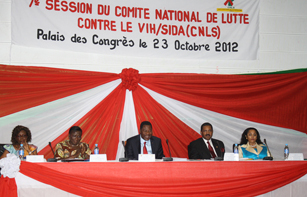
L to R: Dr Sonia Boni, Executice Secretary, National AIDS Committee; Professor Kindé Gazard, Minister of Health; H.E. President Boni Yayi, President of the Republic of Benin; Dr Mamadou Diallo, UNAIDS Director, Regional Support Team for West and Central Africa; Ms Nardos Bekele-Thomas, United Nations Resident Coordinator.
At an extraordinary session of Benin’s National AIDS Committee on 23 October, President Boni Yayi called for a series of measures to accelerate progress in the country’s AIDS response. Held at the Palais des Congrès in Cotonou, the session was attended by more than 350 participants, including ministers, ambassadors and representatives from the private sector, civil society, networks of people living with HIV, and United Nations agencies.
According to government estimates, about 60 000 adults and children are living with HIV in Benin. Over the past decade, Benin has succeeded in reducing national HIV prevalence—from 4.1% in 2001 to 1.2% in 2012. Eight out of ten people living with HIV now have access to antiretroviral treatment and one in two HIV-positive pregnant women have access to services that prevent new HIV infections in children.
To build on these gains, Benin’s President called for improved governance in the AIDS response. He announced that he would rapidly undertake a national audit of the country’s AIDS structures—including the National AIDS Committee (NAC), the Global Fund Country Coordinating Mechanism (CCM) and the national AIDS Control Programme (NACP)—and said that the NAC’s Executive Secretariat, previously under the authority of the Minister of Health, would be placed under his direct leadership.
President Yayi pledged to address the recurrent issue of HIV drug stock-outs by simplifying procurement procedures and adopting special custom regulations for antiretroviral medicines. He said he would focus national efforts on achieving the twin goals of universal coverage to HIV treatment and the elimination of mother-to-child transmission of HIV by 2015.
Though Benin has increased its AIDS budget in recent years, more than 75% of national AIDS investments are funded through external sources. In the spirit of shared responsibility, President Yayi pledged to increase the national HIV budget from US$ 1.2 million to US$ 3.2 million. A new airfare tax earmarked for the national AIDS response was also highlighted.
This is a true example of shared responsibility in action, which is advocated by the UNAIDS Executive Director
Ambassador of France, Jean-Paul Monchau
Donors attending the meeting congratulated Benin’s Head of State on these measures. “This is a true example of shared responsibility in action, which is advocated by the UNAIDS Executive Director,” said the Ambassador of France, Jean-Paul Monchau.
The meeting in Cotonou offered a platform for dialogue between all AIDS stakeholders around the implementation of the African Union’s Roadmap on Shared Responsibility and Global Solidarity for AIDS, Tuberculosis and Malaria.
Launched in July 2012, the Roadmap offers a set of long-term sustainable strategies to finance and provide access to HIV treatment, prevention and other health services in Africa. In his capacity as Chair of the African Union, President Yayi presented the Roadmap to African leaders at a September 2012 high level side event of the UN General Assembly.




